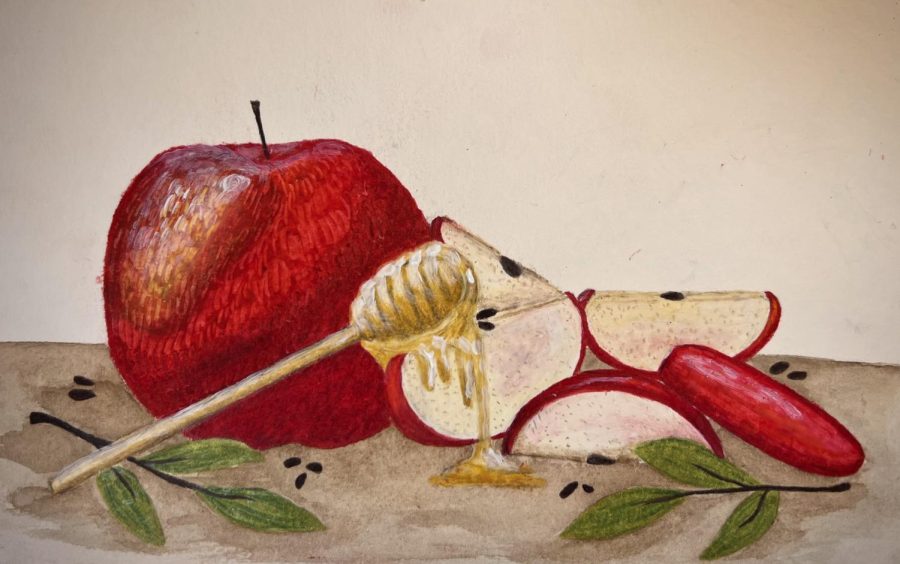Adopting Rosh Hashanah values into the American New Year
October 11, 2022
A new year is the perfect time to start fresh and lay out a plan to be the best version of oneself.
On Jan. 1, Karen starts her 2-week juice cleanse and Frank decides, along with 59% of Americans, that this year he’ll exercise more. At the end of March, Karen and Frank are not following these resolutions, but they’ll try again next year.
Rosh Hashanah, the Jewish New Year, holds a very special place in my heart. It took place this year on Sept. 26 and it is filled with family and food. It’s a time to welcome in the new year with all its sweetness and opportunity.
In the way I observe it, the 10-day period between Rosh Hashanah and Yom Kippur is a time to reflect on the past year and think of what went well, what didn’t and what I hope for in the upcoming year.
Unlike the concept of New Year’s resolutions presented in American pop culture, Rosh Hashanah, translating to “the head of the year,” may include blessings for the new year, but it doesn’t involve making an unrealistic, page-long list of tasks to adopt for an absurdly regimented morning routine.
American pop culture teaches us that come Jan. 1, we must accelerate from zero to 100, eliminate everything that is “unhealthy” or useless from our lives and create wildly unsustainable habits, all in the name of bettering ourselves.
When making big goals too quickly, people are often left feeling frustrated. Sometimes these resolutions can feel too controlling, according to a Dec. 29, 2020 New York Times article.
These New Year’s resolutions often call for extreme changes in our daily habits, leaving us devastated and feeling like we’ve failed when we can’t accomplish them.
The vague goals we set for ourselves—which often include ideas like eating more vegetables or spending less money on makeup—are hard to accomplish, because there is no exact way to quantify them.
From my experience, when something is too vague, it seems daunting so I avoid it completely.
When I pledged to drink more water I ended up either overdoing my water intake or barely drinking water at all because I did not have a specific numerically-measurable goal.
Each year in January, diet culture and toxic gym culture spikes as 13% of individuals swear to eat healthier and 20% of individuals vow to lose weight, according to a 2020 study.
The American media and the culture within it has us constantly in a cycle of self-loathing as we are shown celebrities with perfect skin, bodies and habits. At the change of the calendar year, the media feeds off our insecurities as we pay for “miracle” products and solutions.
I am guilty of setting broad goals of limiting social media, drinking more water and reading at least a book chapter a day. Though these goals do not come from an intentionally self-destructive place, they are still too broad and restrictive and I often only fulfill them for a few weeks at most.
Rosh Hashanah, however, means something very different to me. It reflects values of presence, gratitude and hopefulness. The blessing of “shanah tovah u’metukah,” wishing a good and sweet new year, is passed around and traditional foods include sweet challah, kugle and the well-known apples and honey.
The challah for this particular holiday is not the traditional braided challah but instead a circular challah with raisins, representing both the sweetness of the new year and the continuous circle of life, according to a Chabad article by Rabbi Yehuda Shurpin.
The arrival of Rosh Hashanah symbolizes a time of reflection, a more natural transition into the new year. These values of appreciation and absorption of the past year are not unique to the Jewish culture and do not exclude individual traditions of American families.
The values of health and productivity, however, are taken to the extreme in the spirit of the American New Year tradition, as pop culture preys on people who believe that dieting or a crazy fitness routine will make them a better person.
We must be more forgiving of ourselves, understanding that we can have goals but that going on a two-week shred or a crash diet is not what the new year should be about.
The New Year is about change, yes, but it is also about appreciation and love for ourselves and our families.
We should all take the values of the Jewish New Year forward into the standard American New Year when it arrives, looking at all we’ve done in the past year and enjoying the shifting of time with the people we love.
